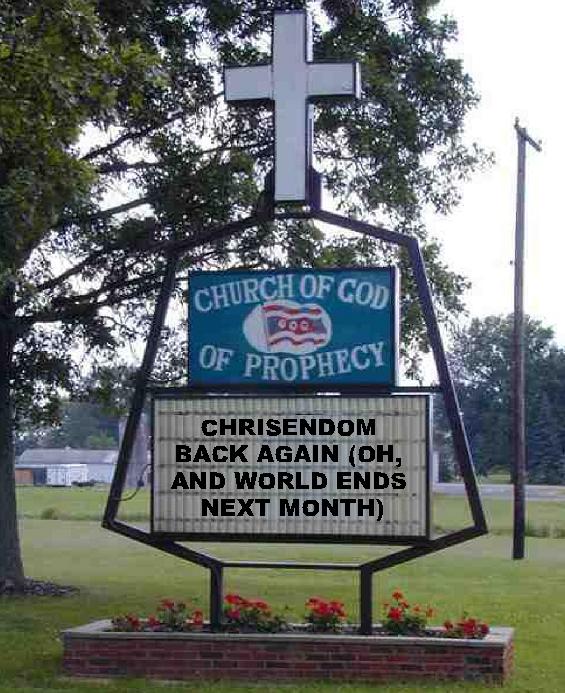Link of the day
Here, Roger Olson speaks some real sense regarding the inerrancy shibboleth.
 Yes, Happy Birthday Jim, 50 today. Jim is not only the most important thing to ever happen to biblioblogging, and a keen scholar with a wit as sharp as his mind, but also a dear friend. I honestly feel privileged to know him as I do, and our laughs together at SBL are unforgettable. Now, at the ripe age of fifty, not only can he expect to have to pee three times a night (instead of twice), but his best two decades lay ahead of him. I thank God for you, Jim (and yea, I know you are southern Baptist, but can you not have just a little tipple of Whiskey today? Tell you what – I'll vicariously enjoy a shot of Jägermeister tonight for you. What are friends for, after all? - Oh, and for everyone else: feel free to redistribute my artwork as you see fit)
Yes, Happy Birthday Jim, 50 today. Jim is not only the most important thing to ever happen to biblioblogging, and a keen scholar with a wit as sharp as his mind, but also a dear friend. I honestly feel privileged to know him as I do, and our laughs together at SBL are unforgettable. Now, at the ripe age of fifty, not only can he expect to have to pee three times a night (instead of twice), but his best two decades lay ahead of him. I thank God for you, Jim (and yea, I know you are southern Baptist, but can you not have just a little tipple of Whiskey today? Tell you what – I'll vicariously enjoy a shot of Jägermeister tonight for you. What are friends for, after all? - Oh, and for everyone else: feel free to redistribute my artwork as you see fit)
 |
| Artwork from http://www.cartoonstock.com/ |
'A single culprit seems to generate our difficulties, namely, a particular individualist - and so possible also rather modern - reading of Paul's justification terminology and argumentation that devolves into a conditional understanding of salvation' (3).If this diagnosis is correct (and DoG sketches preliminary reasons for this judgment in pp. 3-7), not only will major problems in Pauline scholarship potentially all be resolved at once, but more importantly, the Pauline gospel will be heard again with fresh power, to break the idolatry of a false theology trapped by the spirit of the age, and thus empower it to address our lives again. But because the diagnosis of these problems immediately confronts one with the complexly intertwined matters that orbit the vicious circle of hermeneutical, ideological, theological, argumentative, exegetical etc. concerns that relate to reading a text, we must return to DC's two insights noted in Part 2 of this review summary (think James Torrance and 'a set of preliminary characterizations' and you've got it): Part One of DoG will systematically set out the problems relating to the contractual reading of Paul. The problem thus diagnosed will facilitate the prescription of the treatment: a rhetorical and apocalyptic reading of Paul which is, at bottom, all about Jesus and God's un-contractual, or put slightly more elegantly, God's unconditional love.
Labels: Review of Deliverance of God
 |
| Image from http://www.travelprosworld.com/ |
Labels: Review of Deliverance of God
I am no particular Spong fan, but I think he was on top in this argument. Mohler (and later Strobel, via a foundationalist natural theology) was arguing himself into a difficult place, and Spong knew how to lead him there! But ... you decide (did the video squeak like mad at the end through your speakers, too?)
A moving, sensitive portrayal of N.T. Wright's historical Jesus scholarship, and its relation to the theses of Borg and Crossan:
Labels: Steven Harris Art

Yesterday, while in Germany, I came across a Christian music band called Demon Hunter. Apparently their musical prowess is favourably judged by those "in the know" (I do not pretend to be able to adjudicate on the musical merits of a Heavy Metal Band). However, inspired as I now am, I am thinking of starting my own band. No, I can't play a guitar. Or a piano. Or the drums. Or anything come to think of it (apart from the joker), but I do know some fairly famous worship leaders (ability by association), so I'll simply slap on the sound of a computer modem in action and call it Heavy Techno, or something, interspersing the cacophony with sentences like 'hurray for Jesus'. A Christian Heavy Techno Band is born.
Apart from needing other people in the group to jump around in leotards / Bikinis and stuff like that, all I need now is a name likewise as cool as the aforementioned Heavy Metalers.
Beelzebub Dead Arm Givers, or perhaps Hasatan Chinese Burners, or even Belial Wedgie-ers. Perhaps I'll settle for Unclean Spirit Wet Willy-ers, I am still undecided.
I miss Germany (how many Google searches looking for Miss Germany will sniff their way to this page, I wonder), so it is great to breath Tübingen air once again. Thank God for this beautiful place. And boy, do I need a break. In fact, at the airport I even purchased an Incredible Hulk cartoon novel to read – which, I am hoping, will help distance from anything job related, however enjoyable my jobbing can be.
Many of you will remember the extremely sharply witted Steven Harris, and his now sadly deleted blog, World of Sven. As a student during lectures he had an extraordinary gift for theologically related doodling, and some of them were hilarious. He has given me permission to repost some of his pics here. I'll start uploading them tomorrowish.
Until then, if you think back to the strange contradictions that once plagued humans (the liar paradox, the Bertrand, Zeno and Russell paradoxes etc.) here is a modern day conundrum for you to ponder:
'If Harry Potter is so magical, why can't he cure his own eyesight and get laid?' (Frankie Boyle)
 The address was delivered in a huge tent that could cater for thousands ... but only about 200 privileged people arrived to drink deep from the vast wells of my Solomaic wisdom (of course, I had to use a cattle prod to get them in, and drug the tea to keep them from leaving).
The address was delivered in a huge tent that could cater for thousands ... but only about 200 privileged people arrived to drink deep from the vast wells of my Solomaic wisdom (of course, I had to use a cattle prod to get them in, and drug the tea to keep them from leaving).Sitting in my office today, I tried to prepare for some upcoming lectures on Galatians. Yet on listening to this track, all I wanted to do was get up and wriggle my butt around (sorry if that image makes you cough up your dinner/sugar puffs)
 Odd what you stumble on when YouTube surfing. I recently came across a video that reminded me of a rather curious blog-altercation with a film producer whose thesis I subtly challenged in an earlier series of posts. He demanded I take down pictures I copied from his webpage, and got huffy at my jibes. I obliged about the pictures but stated his theology was abunchofcrap-ology – you know how such exchanges go.
Odd what you stumble on when YouTube surfing. I recently came across a video that reminded me of a rather curious blog-altercation with a film producer whose thesis I subtly challenged in an earlier series of posts. He demanded I take down pictures I copied from his webpage, and got huffy at my jibes. I obliged about the pictures but stated his theology was abunchofcrap-ology – you know how such exchanges go.
This new video-maker claims that his pro-cannabis bible essay does not presume his religiosity. Indeed, he writes with eminent clarity: 'Make it known that I am in NO way religious, Christianity or Rastafarianism'. Fair enough.
It was the next sentence that amused me. For the question everyone really wants to have answered is probably not whether he is religious but whether he is personally a 'user'? (or is that just me?) You see, I want to know whether there is an agenda here: Does he himself skinny dip in enough Cannabis to make even Welsh town names pronounceable?
And just at this point, not entirely surprisingly, a little ambiguity creeps in to his language:
'[N]or do I particularly partake in the consumption of cannabis'.
I suppose the added 'particularly' functions as 'necessarily', i.e. 'it is not the necessary corollary of this video that I am a user'.
In other words, the 'particularly' would probably be best understood to be of the 'give me another drag before I punch your sister' variety.
But this is all an aside as the director adds: 'This is an educational video'.
So go and be educated by a bizarre barrage of no-doubt well meant but nevertheless largely sloppy, anachronistic and out of context proof-texting: http://www.youtube.com/watch?v=xQEm-oGn78g

Labels: Review of Deliverance of God

Yes, you read right. Your favourite blog is about to reopen* – back to correct the torrent of lunatic slop that smears your computer screens like the remnants of an old sneeze, back, bringing forth holy stuff and theological precision, speaking the truth in ... ways the make me look cleverer than others.
First off ...
*Drum roll*
I will begin my summary review of Douglas Campbell's magisterial volume The Deliverance of God.
'What, another review of that flippin book?'
Yes. The best yet. And I'll use longer words than others.
Second off
*drum roll*
per usual, and fairly constantly, any other nefarious bilge I can think of, you know, the expected dysenterous gushings of a trivial mind, frothing up wad loads of crossing-the-line bull.
* This is all proclaimed with the small disclaimer that my reopening is conditional upon me not getting bored with the whole shebang again.